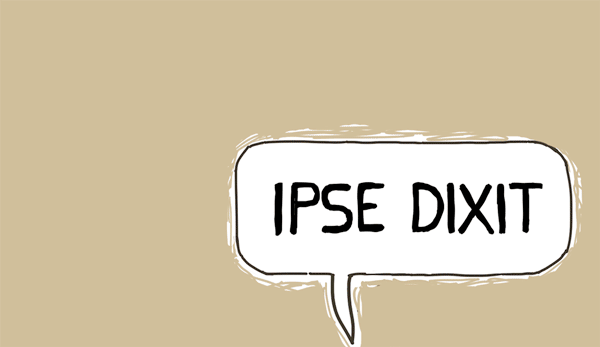We post news and comment on federal criminal justice issues, focused primarily on trial and post-conviction matters, legislative initiatives, and sentencing issues.

IPSE DIXIT
Like I’ve said before, “ipse dixit” is a cool Latin phrase that essentially means “he himself has said it.” Essentially, an ipse dixit is a statement that is considered to be true for no better reason than someone in authority has said it was true.
 Some documents are confidential? Ukraine is run by Nazis? Inflation is transitory? Ipse dixits, every one of them…
Some documents are confidential? Ukraine is run by Nazis? Inflation is transitory? Ipse dixits, every one of them…
Edward Gibbs pled to an indictment accusing him of trafficking in at least 500 grams of meth (methamphetamine to your purists). That’s all he’d admit to. The Presentence Report found relevant conduct: 839 grams of meth seized from his car, a 907-gram deal Ed tried to set up with a co-defendant, and another 907-gram deal that Ed engineered for his son. The PSR also stated – without any explanation whatsoever – that during the conspiracy, a co-conspirator “distributed over 4.5 kilograms of methamphetamine ice” to members of the charged conspiracy,” all of which went into Eddie’s Guidelines calculation.
With the extra 4.5 kilos of “ice,” Ed’s sentencing range was 235-293 months. Without it, he was looking at 188-235 months.
Naturally, Ed’s lawyer objected. The Assistant United States Attorney said Eddie had admitted to it in a proffer session. Ed’s lawyer had been there and remembered nothing of the such. The AUSA had not been at the meeting but said she had seen notes from an agent who had been. The judge overruled Ed’s objections to the drug quantity, accepting the AUSA’s representations as evidence.
And why not? After all, the AUSA is an agent of the government, and she said it was so. It must be so.
Last week, the 7th Circuit reversed. While district courts may consider evidence that would not be admissible at trial, that information nonetheless must have some basis. A sentencing judge may “rely on a presentence report if it ‘is well-supported and appears reliable.'” If a PSR meets those criteria, the burden shifts to the defendant to “com[e] forward with facts demonstrating that the information in the PSR is inaccurate or unreliable.
Generally, a bare denial is not enough to shift the burden back to the prosecution to prove that the PSR‘s account is accurate. “But this all assumes that the PSR has a solid basis,” the 7th said. “If a PSR “asserts ‘nothing but a naked or unsupported charge,'” then a defendant’s denial is enough to ‘cast doubts on its accuracy’. Similarly, if the PSR omits crucial information, then the defendant’s denial alone can shift the burden of proof back to the prosecution.
“Here,” the 7th held, “the district court did not have any evidence backing up the AUSA’s eleventh-hour representations about what the evidence would show, and so nothing was available to resolve the dispute about drug quantity… In the end the only thing in the record was counsel’s statement.”
That statement was an ipse dixit, and that, the Circuit said, “falls short of proof.”
United States v. Gibbs, Case No 20-3304, 2022 U.S. App LEXIS 4706 (7th Cir., February 22, 2022)
– Thomas L. Root

